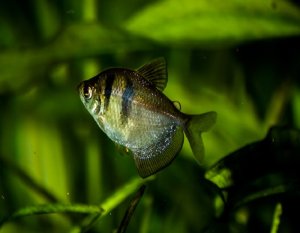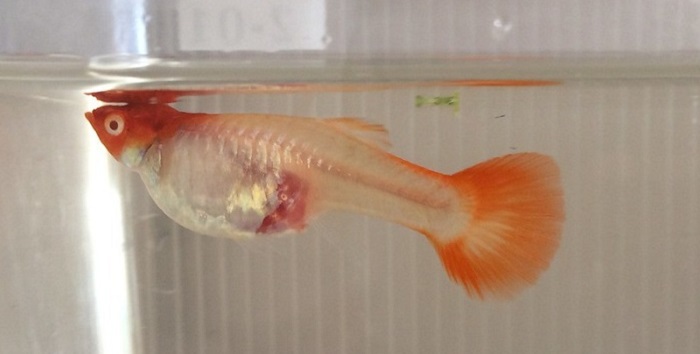
How do you care for a pregnant Guppy Fish? You may never have intended to breed your fish, but still find yourself asking this question because Guppies become pregnant very easily. In addition, they are livebearers, so even if you are familiar with breeding other fish, you will find Guppies have different needs.
Fortunately, these are robust and hardy fish that tolerate change well. Read on to find out how to look after a pregnant Guppy and ensure both the mother and the Guppy fry are happy and healthy.
How Do Guppy Fish Become Pregnant?
One of the things that attract many aquarists to breeding Guppies is how easily these fish become pregnant. But, how do Guppies mate? As these fish are livebearers, the fertilization of eggs takes place inside the female guppy’s womb. Yes, you read that right! Female Guppies actually have a womb, like warm-blooded animals, although they are not warm-blooded.
When a female Guppy is ready to mate she will display her readiness for mating via her body language and the male will insert a specialized anal fin, called a gonopodium, into her genital opening to inseminate her eggs. In fact, female Guppy behavior is one of the main things that triggers male Guppy courtship.
How To Tell If A Guppy Is Pregnant
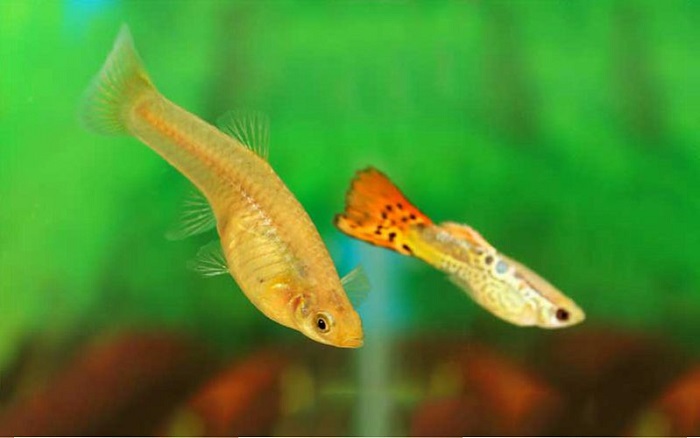
It is possible that you may have missed the Guppy mating process, as it often happens very quickly. Guppies are feisty and often aggressive fish, so sometimes mating can look like run-of-the-mill aggression. However, you can tell if a female Guppy is pregnant with a few telltale signs.
Visible Signs Of Pregnancy In Guppy Fish
You’d be correct in thinking that your pregnant Guppy will develop a swollen abdomen. However, pregnancy in Guppy Fish can often be confused with some diseases. As a result, it’s important to look a little closer to tell if your fish is truly pregnant. Some of the best ways to do so are below:
- Gravid Spot: The gravid spot is a dark spot near the anal fin of your fish. It starts off as a pale yellow and darkens to a black color before your Guppy gives birth. This spot is near the uterus and the developing fry, and it is a good way of telling whether your fish is pregnant. Not only can you see it visibly, it’s color is a way of indicating not just if your fish is pregnant, but how far into gestation your Guppy is.
- Swollen Stomach: A swollen stomach is a bit harder to use as a sign, as it can also indicate dropsy or other diseases. However, combined with the gravid spot, it is a big indicator your fish is carrying young.
Behavioral Signs Of Pregnant Guppy Fish
- Greater Need For Food: You won’t be surprised that when a Guppy is pregnant, they tend to eat more than usual. If you notice a female fish with a swollen abdomen being particularly greedy, this can definitely be a big indicator of pregnancy in Guppy Fish.
- Lethargy: A pregnant Guppy will be much more lethargic than her tankmates. You may see her swimming more slowly, or sitting at the bottom of the tank. However, always check for other pregnancy signs, such as the gravid spot. This is because lethargy can actually be a sign of disease.
- Change In Swimming Pattern: Similar to lethargy, you may find your guppy’s swimming pattern changes. A pregnant fish will swim slowly and might sway a little in the water as they are carrying more weight.
Author’s Note: Ensure you don’t mistake this for swim bladder disease! A good sign is that pregnant Guppies may become more aggressive to tankmates that approach them, showing lots of energy at these moments, whereas sick fish will be lethargic all the time.
Tank Setup And Maintenance For Pregnant Guppy Fish
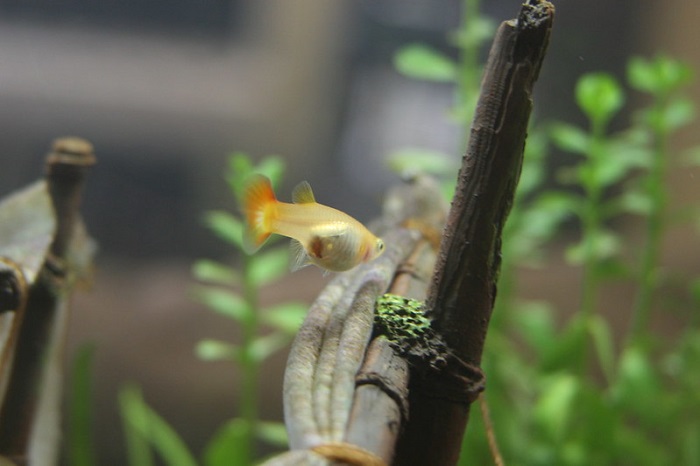
The biggest decision you will have to make about pregnant Guppy care is whether you keep them in the main tank or use a separate breeding tank. If you have an accidental Guppy pregnancy on your hands, you may not wish to invest in other equipment or be able to afford to. Guppies are hardy and can give birth in a community tank. However, bear in mind you lower stress and risk of complication by using a breeding tank.
What Is A Breeding Box?
A breeding box is a small box you can put in the community tank to contain a pregnant guppy. It means you don’t have to set up a whole new tank.
However, one of the risks of breeding boxes is that due to their small size, they can be stressful environments. This stress can lead to your pregnant Guppy Fish giving birth too early and suffering complications.
Planning For Pregnant Guppy Care
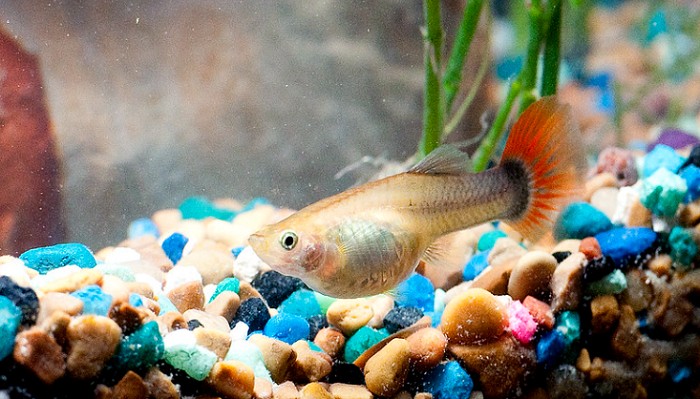
If you have actively planned to breed your Guppies, you will most likely have the time and money set aside to prepare for a separate breeding tank. If this is the case, it’s easy to set up. Plants and rocks make your Guppy feel safer, and you can use a sand or gravel substrate. Otherwise, it’s pretty much the same as a regular Guppy tank. However, bear in mind that in the later stages of pregnancy, your fish’s temperature tolerance may go down slightly.
Feeding A Pregnant Guppy
It’s no surprise that a pregnant Guppy Fish needs more nutrition! Remember that they will be using more energy – not just to nurture the young but also to carry the extra weight around. Here are some tips:
1. Do Pregnant Guppy Fish Need More Food?
Pregnant Guppy Fish do need a bit more food than non-pregnant fish. Instead, one of the best things to change is feed them little and often (3-4 times per day). This kind of feeding keeps your fish’s energy levels up and ensures they don’t get tired. As a result, it prevents stress and keeps them in tip-top condition. Remember, pregnancy will make your Guppy’s metabolism very different!
2. Do Pregnant Guppies Need Different Food?
Yes, it’s a good idea to alter the diet slightly compared to a non-pregnant guppy. Female pregnant Guppies need varied and nutritious food. This means if you normally feed them just on flakes or pellets, consider adding some free swimming live protein to your tank. Daphnia, brine shrimps, and bloodworms are all good choices.
It’s really important to ensure pregnant female Guppies get enough nutrition. That’s why, if your Guppy Fish is not eating, keep an eye out for potential signs of stress or disease.
Pregnant Guppy Behavioral Changes
For pregnant Guppies, one of the biggest behavioral changes is aggression.For pregnant Guppies, one of the biggest behavioral changes is aggression. This is because she is fiercely trying to guard her young. However, it can also be because even when pregnant, males will still try to mate with her.
Another behavioral change you will see is hiding. Pregnant Guppies may hide away in order to rest or avoid other fish. As a result, it’s good to make sure there are opportunities to hide in the tank. These can be behind rocks, amongst plants, in caves, or in bits of driftwood.
How To Keep Pregnant Guppy Fish Healthy
Fortunately, Guppies are easy to care for fish and they will breed in the average tropical tank conditions. However, this doesn’t mean you can neglect them! As a result, it’s best to know the top causes of stress and complications in pregnant Guppies.
Males that try to mate with her, overcrowding, and insufficient water changes, are all causes of stress for female Guppies. Ensure you clean your tank by removing at least a third of the water once a week and replacing it with fresh water, and consider a separate breeding tank.
Common Diseases And Complications
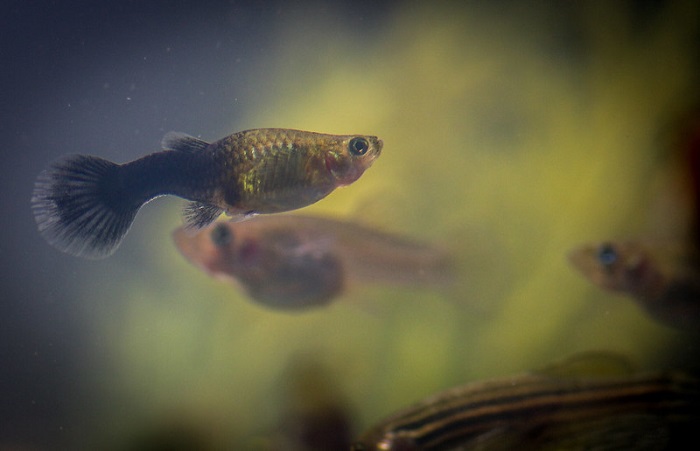
One of the most common complications in Guppy’s pregnancy is miscarriage. This occurs when the mother guppy’s body reabsorbs the fry due to stress or poor nutrition. Alternatively, in the late stages of pregnancy, the mother can occasionally die. Thus, it’s good to know the signs of death in Guppy Fish.
Apart from this, Guppies can suffer from many of the same diseases as they would whilst not pregnant. Some of the most common include:
1. Parasitic Infections
Because your Guppy is using more energy during its pregnancy, it is also more sensitive. Thus, it can be more prone to parasitic infections such as gill flukes. To treat these, you need to use the same treatments as you would otherwise, but bear in mind if your pregnant Guppy has already developed a parasitic infection, it’s unlikely they won’t survive.
2. Bacterial And Fungal Infections
Like with parasitic infections, it’s best to treat these as usual with over-the-counter medicine and by moving your sick fish to a separate tank to treat them. However, in the same way, the outcome isn’t often very good. Pregnant fish can get abnormally stressed by a tank move and therefore it’s best not to let them get sick in the first place.
Author’s Note: This is another reason why it’s a good idea to use a separate breeding tank if you are serious about your pregnant guppy’s survival. It makes it easier to treat diseases, and it can also minimize stress in the first place, meaning they are less likely to succumb to them.
3. Dropsy
Dropsy is a serious bacterial infection of the kidneys and unfortunately, there are very few fish that survive it. However, it’s important to know how to spot the symptoms, including abdominal swelling and lethargy, which can look similar to pregnancy in Guppies.
The best way to tell the difference is by checking the presence of the gravid spot – the dark spot near the guppy’s anal fin that starts off as a yellowish color and gets darker before the Guppy gives birth. It is also a good way of checking how swollen the abdomen of your Guppy is. A Guppy with dropsy won’t have its gravid spot darken over time in the same way a pregnant Guppy will.
4. Swim Bladder Disease
Swim bladder disease is another disorder that can be treated with medication, although again, this is harder in pregnant fish due to the added stress levels. It can affect your fish’s ability to stay upright in the water, and make them pretty lethargic.
A good way of telling the difference is that a Guppy with swim bladder disease generally won’t improve at any point. However, even though pregnant Guppies are lethargic some of the time, they can still be pretty energetic in defending themselves!
Tankmates And Aggression
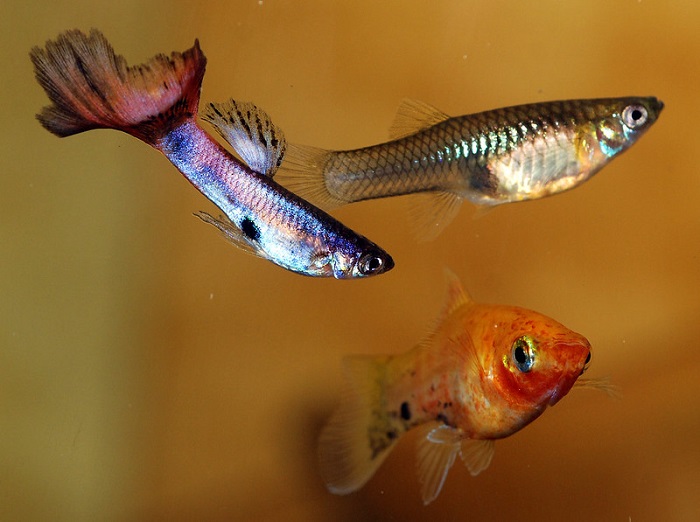
Female Guppies can become aggressive! This generally happens to male Guppies of the same spaces. Due to their attempts to mate, a pregnant female Guppy generally won’t want male Guppies anywhere near her and she may chase them away. Whilst it looks like your female can defend herself, minimizing aggression is always a good idea. If it looks like your female is getting too aggressive, it’s best to move her to a separate breeding tank.
Benefits Of Separate Tanks
As a rule of thumb, your Guppy is less likely to experience complications if you keep them in a separate breeding tank. And complications can and do occur. Pregnant Guppies can die in delivery if the fry gets stuck in the gestation tube, something that can happen if they are deformed. And they can give birth early if you use a breeding box too early, as despite keeping the fish away from aggressive tankmates, these can be stressful environments.
However, in a separate tank, you have a much higher chance of the pregnancy going off without a hitch.
How Do Pregnant Guppies Give Birth?
Pregnant Guppies are livebearers, and generally, they will find a secluded spot in the tank to give birth. When the fry emerges from your guppy’s uterus, they are generally curled up and will sink to the bottom of the taken. However, after this, they unfurl and begin swimming immediately.
Author’s Note: You may occasionally see a long fleshy filament hanging from near your pregnant guppy’s anal fin. This serves to protect the young when your Guppy gives birth and is an extension of the egg sac. It keeps them safe from bacteria and any other pathogens in the water.
Bottom Line
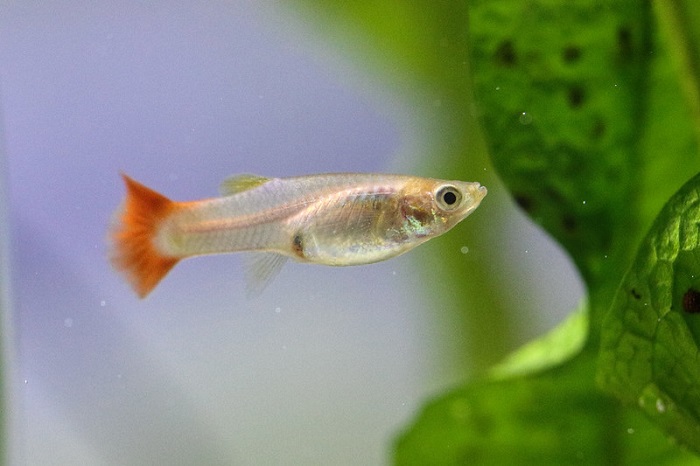
It’s not hard to care for livebearers like Guppies through pregnancy. In fact, along with mollies, these are some of the easiest popular aquarium fish for beginners to breed. However, don’t let this make you think they are hands-off!
Just like any fish, pregnant Guppies will thrive with sufficient space, care, and attention. It’s best advised to use a separate tank, but either way, the effort you put into looking after your pregnant Guppy will reward you with happy, healthy Guppy fry that will grow into bold, colorful adults.


